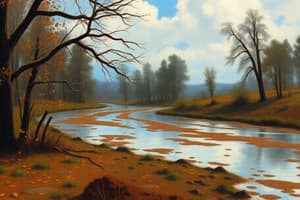Podcast
Questions and Answers
Which of the following best describes an environmental ethic?
Which of the following best describes an environmental ethic?
- A set of laws and regulations governing environmental protection
- The value or worth of an object based on its usefulness to humans
- The tendency of individuals to abuse commonly held resources
- A personal philosophy that influences how one interacts with the natural environment (correct)
What is the defining characteristic of a social trap?
What is the defining characteristic of a social trap?
- The fall of a complex human society
- A life-centered approach that views all life as having intrinsic value
- Decisions that provide a short-term benefit but hurt society in the long run (correct)
- The tendency of individuals to maximize their own personal interest
Which of the following worldviews assigns intrinsic value only to humans?
Which of the following worldviews assigns intrinsic value only to humans?
- Anthropocentric worldview (correct)
- Ecocentric worldview
- Instrumental value
- Biocentric worldview
What is the defining characteristic of the tragedy of the commons?
What is the defining characteristic of the tragedy of the commons?
What is the defining characteristic of a sliding reinforcer?
What is the defining characteristic of a sliding reinforcer?
Which worldview values intact ecosystems over individual parts?
Which worldview values intact ecosystems over individual parts?
What does empirical science primarily rely on to investigate the natural world?
What does empirical science primarily rely on to investigate the natural world?
Which term refers to the population size that a particular environment can support indefinitely?
Which term refers to the population size that a particular environment can support indefinitely?
What is the primary focus of applied science?
What is the primary focus of applied science?
Which term describes the variety of species on Earth?
Which term describes the variety of species on Earth?
What does sustainable development aim to achieve?
What does sustainable development aim to achieve?
Which term represents the land needed to provide resources and assimilate waste for a person or population?
Which term represents the land needed to provide resources and assimilate waste for a person or population?
Flashcards are hidden until you start studying
Study Notes
Environmental Science and Sustainability
- Environmental literacy is a basic understanding of how ecosystems function and the impact of our choices on the environment.
- Empirical science involves systematic observation and experimentation to investigate the natural world.
- Applied science is research whose findings are used to help solve practical problems.
Key Concepts
- Trade-offs are the imperfect and sometimes problematic responses that we must choose between when addressing complex problems.
- The triple bottom line considers the environmental, social, and economic impacts of our choices.
- Sustainable development meets present needs without compromising the ability of future generations to do the same.
Environmental Systems
- Carrying capacity is the population size that a particular environment can support indefinitely.
- Ecological footprint is the land needed to provide the resources and assimilate the waste of a person or population.
Human Impact
- Anthropogenic refers to things caused by or related to human action.
- Biodiversity is the variety of species on Earth.
Worldviews and Ethics
- Worldview is the window through which one views one's world and exists.
- Environmental ethic is the personal philosophy that influences how a person interacts with their natural environment.
- Anthropocentric worldview is a human-centered view that assigns intrinsic value only to humans.
- Instrumental value is the value or worth of an object, organism, or species based on its usefulness to humans.
- Biocentric worldview is a life-centered approach that views all life as having intrinsic value, regardless of its usefulness to humans.
- Ecocentric worldview is a system-centered view that values intact ecosystems, not just the individual parts.
- Intrinsic value is the value or worth of an object, organism, or species based on its mere existence.
Societal Impacts
- Social traps are decisions by individuals or groups that seem good at the time and produce a short-term benefit, but that hurt society in the long run.
- Tragedy of the commons is the tendency of an individual to abuse commonly held resources in order to maximize their own personal interest.
- Sliding reinforcer is an action that is beneficial at first but that changes conditions such that its benefit declines over time.
- Societal collapse is the fall of a complex human society.
Studying That Suits You
Use AI to generate personalized quizzes and flashcards to suit your learning preferences.



